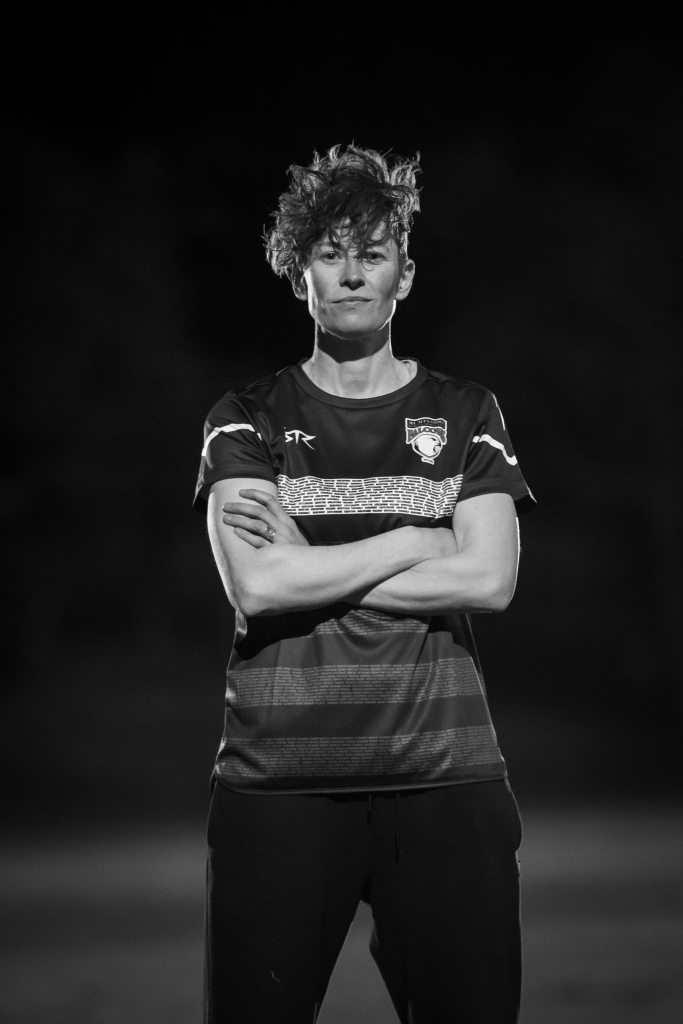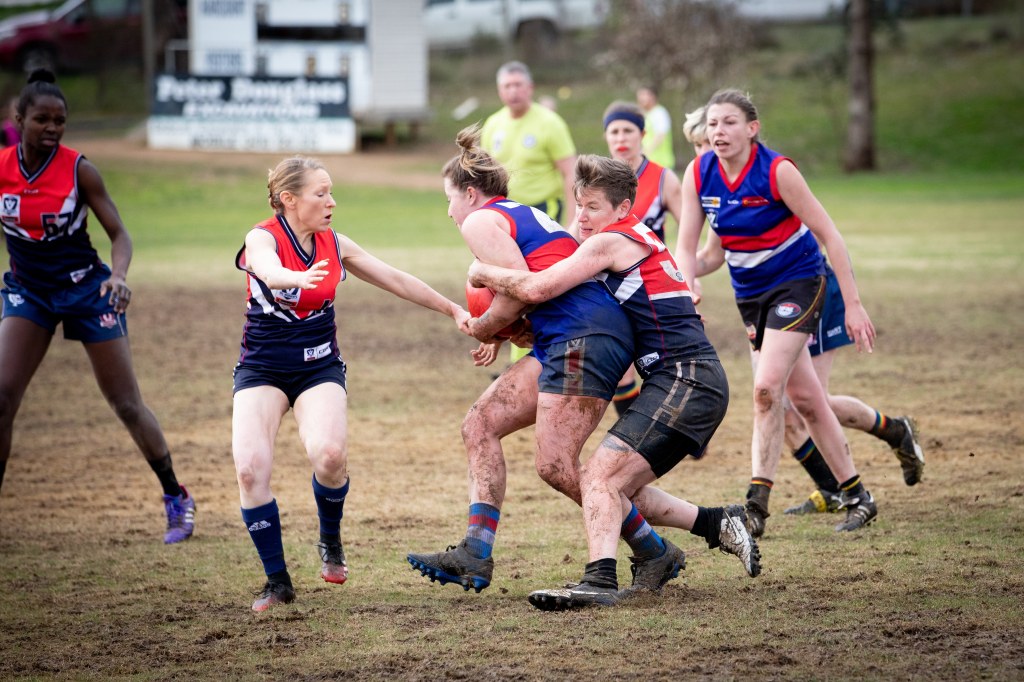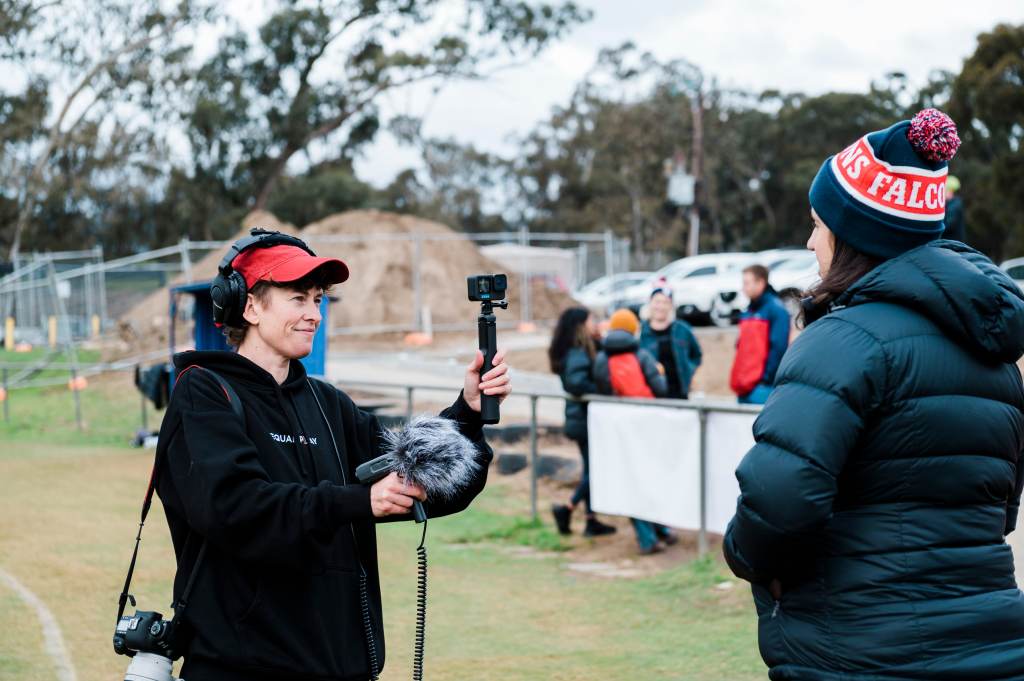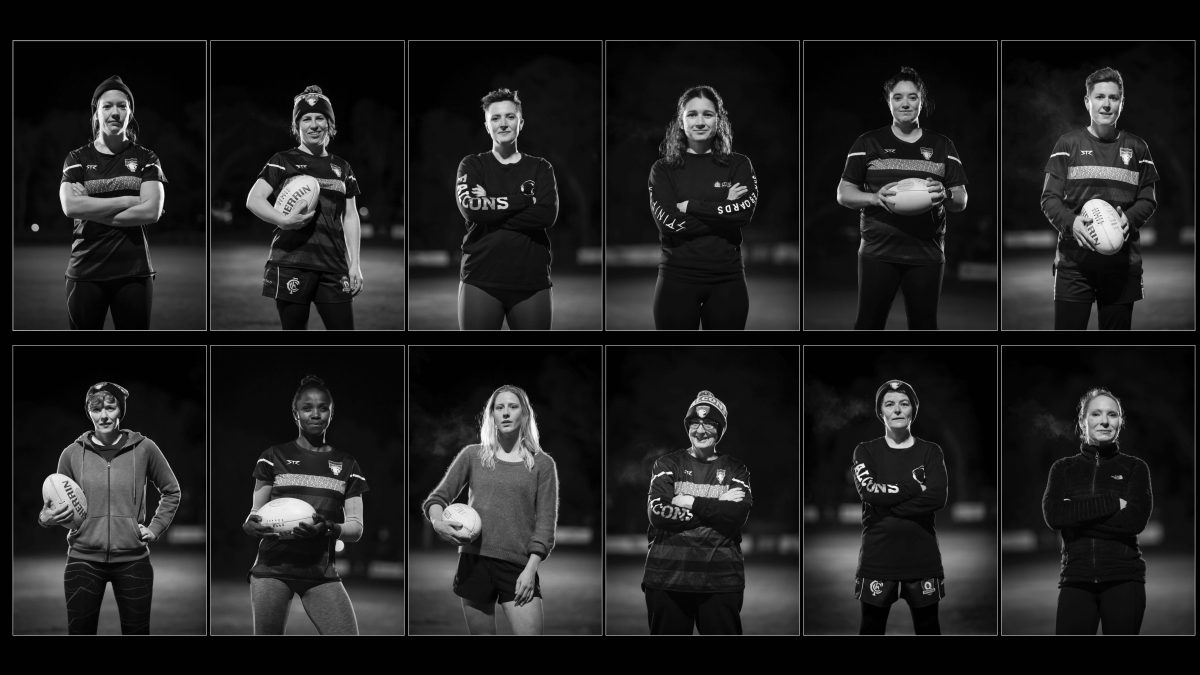When a filmmaker joins a new local women’s footy club in central Victoria, a simple desire to play becomes a complex journey of inclusion and belonging. An unexpected turn of events means the team has to fight to play. Their campaign challenges age-old traditions and joins the wider movement for gender equity. We speak with Mitch Nivalis, director of Equal The Contest, ahead of the film’s world premiere at the Castlemaine Documentary Festival this June.
Hi Mitch, can you give us an overview of Equal the Contest?
Sure! Equal the Contest follows the Mount Alexander Falcons football club, a new community AFL club created in 2021 by and for women and gender-diverse people. It also follows my own journey learning to play football at 42 years of age as an inexperienced, non-binary person.
Despite fulfilling all the requirements of a new club, we had our application to field a team in 2022 rejected by AFL Central Victoria and weren’t given an official reason. So we forged ahead, collecting public support, building community and developing our players to create a club from scratch with diversity and inclusion at its core, while challenging the traditions of AFL.
It’s a rollercoaster of a ride as we come up against it in every way off field, and it’s a totally new perspective on football as the games and training were shot with cameras attached to my body.
You’ve worked in the area of gender equity before. Can you talk a little about this issue, why it’s important to you and how you have examined it (and promoted it) in your work?
Gender equity feels a bit like my life’s work and Equal the Contest is the current iteration of that work. Since I was a little kid I’ve felt like I don’t fit the gender binary and, as a result, when I was young I always felt like there was something wrong with me.

I had so many aspects of my life restricted because of my gender: things I wanted to participate in, like sport, ways I wanted to dress, ways I wanted to express myself. So I’ve always felt unable to truly explore my potential. Societal constructs influenced the people around me, which in turn influenced my own belief in what I was capable of and that led to a really depressed period during my teenage years.
When I became a photographer and filmmaker in 2004, I realised my creativity gave me this power to rewrite the narrative around what it is to be male, or female, or trans or non-binary. What it is to be human essentially, and how we might all be able to explore our potential more fully if we weren’t being limited by the gender binary and everything that comes with that.
Equal the Contest – Official Trailer from MDP Photography & Video on Vimeo.
And so I started getting really conscious about the type of jobs I wanted to accept as a photographer and filmmaker and the types of projects I wanted to be known for.
In 2020, Covid created this unique opportunity where, in the peak of my career, I was unable to work because of restrictions. So I was lucky to secure a grant from Creative Victoria and Regional Arts Victoria and I interviewed photographers across regional Victoria to see if they understood the power to make change that they also held in this space, and further, to see if they understood the connection between photography (or visual representation), gender inequality and gender based violence.
It was a fascinating project, which resulted in my report called Photographers as changemakers. I then built on that project to produce a guide for organisations on creating diverse and inclusive image libraries called Picture change.
Towards the end of 2021, I enrolled in a Master of Arts (Photography) at Photography Studies College in Melbourne as a challenge to myself to see if I could become a different maker. To see if I could find new ways of challenging gender roles and stereotypes through image making. That’s how Equal the Contest came about and it’s by far my most ambitious work to date, but it also feels like the coming together of my whole lived experience, which I hope also resonates with anyone else who’s keenly felt the impacts of gender inequality.
My impression of sport is that it’s something of a microcosm of national identity (and traditionally a particularly charged arena of bigotry and sexism). What did you discover in the making of this film that confirmed or contradicted those preconceptions?
It is a microcosm of national identity, but one that only some people, historically, have had access to, or whose identity is represented within that.
Equal the Contest is a bit of a case-study to demonstrate the barriers that still exist for women and gender-diverse people to participate in sport in Australia today. Particularly in AFL.

It’s also a joyous example of what happens when you create a space specifically for women and gender-diverse people, with their needs at the forefront, instead of tacking on women’s teams to already existing male clubs without attempting to make true space or change.
AFL has a history of on and off field violence, bravado and, as you mention, bigotry and sexism. But it doesn’t have to be that way. This is how the game has been modelled to date. But we have a huge opportunity to demonstrate a new way of structuring a club. A new way of creating club culture. A new way of playing the game.
Through the film, we see unlikely people (including myself) become AFL footballers, regardless of our age, ability, sexuality or gender identity. The film is an attempt at rewriting the narrative around who belongs on a football field, what it is to win (spoiler, it’s not about the scoreboard), what our bodies as women and gender-diverse people are capable of and removing the notion of violence from strength.
During the making of the film, I also came across a local women’s football team who had played in 1948 and discovered one of their players was still alive. Through learning about her story, I realised just how similar our own journey was, in attempting to play in 2022.
There’s a sense that we’ve got AFLW now, so the work is finished, but the truth is we’ve got a huge way to go before we even get close to gender equity in AFL (or even I’d say sport more broadly), particularly at community level.
You’re both a photographer and a director – I imagine both vocations bleed into each other and help each other out. Is this the case? Can you talk about this – what’s gained from having both skills?
As a photographer, I’m always looking for a defining moment. A split second that can tell a story without needing the moment before or the moment after, or dialogue. As a filmmaker or director, I’m looking for the bigger picture.
So having both backgrounds, or both skills, means I’m constantly looking at each shot as a defining moment as well as how it contributes to a bigger picture. Like, if I pulled out this shot, could it stand alone and tell a story? Yet at the same time does it contribute to the overall narrative cohesively?
What became most interesting in making Equal the Contest was the way my role as DoP and Director both bled into being a participant in the film. Trying to be completely present in the experience of learning to play football at the same time as documenting my own vulnerability was extremely challenging.

I was having to record myself in moments that I just wanted to be private from a personal perspective, but knew they were really important moments from a narrative perspective. Ultimately this film felt bigger than myself. It took on a life of its own and in moments where I felt like it was all too challenging personally, as a storyteller I kept reminding myself of the importance of representation and creating new narratives.
That’s what kept me going. I want to contribute to change, so that our ideas around gender shift and ultimately that aligns with my roles as a participant as well as a filmmaker and director, so everything came together in my desire for change.
The world premiere of Equal The Contest will take place at the Castlemaine Documentary Festival (followed by a panel discussion, I believe). Can you give a sense of how you’re feeling about this?
Having Equal the Contest selected to screen at the Castlemaine Documentary Film Festival was the perfect way to premiere the film in my mind. The film really redefines what winning is and what success is on the football field and the centre of all of this is the players.
So to premiere the film in our club’s home town of Castlemaine, where our players can come and bring their families and see themselves represented on the big screen, is just the best.
I’ll be extremely nervous, but I’m going to be doing my best to be really present and revel in the atmosphere and joy and pride that I know we’ll all be feeling. So many of us have played sport our whole lives, but almost none of us had ever been worthy of having a photographer turn up to capture our games. Let alone a filmmaker dedicating almost two years of their life to document our experiences.
We’ve never seen what we look like playing sport up until this moment, so being able to show that first to all of our players will be huge.
What I hope people walk away with is a deeper understanding of the impacts of gender inequality in sport. It’s so difficult for people (mainly men) who sit outside of this space to truly understand just how many barriers are still in place for women and gender-diverse people to participate in sport. So, particularly as the film rolls out and we start to do hosted screenings at football clubs and organisations, with an impact campaign along side, I hope people really start to understand.
And further to that, I hope the fear around trans and gender-diverse inclusion in sport starts to dissipate, so that our sporting clubs become safe spaces for everyone. There’s so much joy in the film in moments when we get to take to the field and everyone deserves the right to access that joy, free from fear of discrimination, judgement or violence.
Equal the Contest has its world premiere at the Castlemaine Documentary Festival on Saturday 17 June 2023, with a post-screening presentation and Q&A with Director Mitch Nivalis. More information. There are also a limited number of tickets to watch the film online for those who can’t travel to Castlemaine for the festival, available online now.
